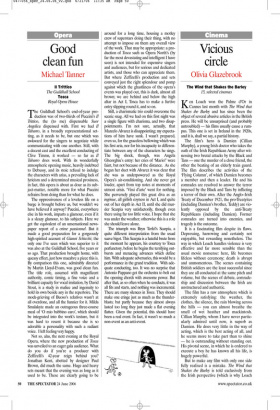Good clean fun
Michael Tanner
Il Trittico The Guildhall School Tosca Royal Opera House The Guildhall School’s end-of-year production was of two-thirds of Puccini’s Il Trittico, the (to me) dispensable Suor Angelica dispensed with. First we had Il Tabarro, in a broadly representational setting, as it needs to be, but one which was awkward for the singers to negotiate while communicating with one another. Still, with a decent cast and the excellent conducting of Clive Timms, it worked — so far as Il Tabarro does work. With its wonderfully atmospheric opening music, heavily indebted to Debussy, and its stoic refusal to indulge the characters with arias, a prevailing lack of lyricism and a determined musical prosiness, in fact, this opera is about as dour as its subject-matter, notable more for what Puccini refrains from doing than for what he does.
The oppressiveness of a loveless life on a barge is brought before us, but wouldn’t we have believed it anyway? Puccini, everywhere else in his work, imparts a glamour, even if it is a sleazy glamour, to his subjects. Here we get the equivalent of an unsensational newspaper report of a crime passionnel. But it made a good preparation for a gorgeously high-spirited account of Gianni Schicchi; the only one I’ve seen which was superior to it was also at the Guildhall School, five years or so ago. That production brought home, with queasy effect, just how macabre a piece this is. By comparison this one, admirably directed by Martin Lloyd-Evans, was good clean fun. The title role, assumed with magnificent authority, comic timing, a fine voice and a brilliant capacity for vocal imitation, by David Stout, is a study in malice and ingenuity to hold its own beside any in the repertoire. The mock-grieving of Buoso’s relatives wasn’t at all overdone, and all the funnier for it. Milda Smalakyte made an outrageous three-course meal of ‘O mio babbino caro’, which should be integrated into the work’s texture, but it was hard to resent it because she is so adorable a personality with such a radiant voice. I left feeling very happy.
Not so, alas, the next evening at the Royal Opera, where the new production of Tosca was unveiled to an eager gala audience. What do you do if you’re a producer with Zeffirelli’s 42-year reign behind you? Jonathan Kent, abetted by designer Paul Brown, did much the same. Huge and heavy sets meant that the evening was as long as it used to be. These are clearly going to be around for a long time, housing a motley crew of superstars doing their thing, with no attempt to impose on them any overall view of the work. That may be appropriate: a production of Tosca such as Opera North’s (by far the most devastating and intelligent I have seen) is not intended for expensive singers and audiences, but for serious and dedicated artists, and those who can appreciate them. But where Zeffirelli’s production and sets conveyed just the right splendour and pomp against which the ghastliness of the opera’s events was played out, this is dark, almost all brown; we are behind and below the high altar in Act I, Tosca has to make a furtive entry slipping round it, and so on.
Still, a charismatic trio could overcome the scenic snag. All we had on this first night was a single figure with charisma, and two disappointments. I’m not sure, actually, that Marcelo Alvarez is disappointing; my expectations of him have sunk. I wasn’t prepared, even so, for the graceless bellowing which was his first aria, nor for his incapacity to differentiate between any of the characters he sings. The big shock, though, was Angela Gheorghiu’s entry: her cries of ‘Mario!’ were faint, but not because of the distance. As she began her duet with Alvarez it was clear that she was as underpowered as the Royal Opera’s air-conditioning. And she never got louder, apart from top notes at moments of utmost crisis. ‘Vissi d’arte’ went for nothing. She perversely played this great diva as an ingénue, all girlish coyness in Act I, and quite out of her depth in Act II, until she did murder Scarpia very satisfactorily, though even there using far too little voice. I hope that she was under the weather; otherwise this is a role she should leave alone.
The triumph was Bryn Terfel’s Scarpia, a quite different interpretation from the usual suave bigot. This Scarpia is a hateful brute from the moment he appears, his courtesy to Tosca perfunctory, before he begins the terrifying outbursts and menacing advances which define him. With adequate adversaries, this would be a performance in the grand tradition. With adequate conducting, too. It was no surprise that Antonio Pappano got the orchestra to belt out the opening chords with awesome power. But after that, as so often when he conducts, it was all fits and starts, and nothing was incremental. There are many silences in Tosca. They should make one cringe just as much as the thunderblasts; but partly because they almost always lasted too long they just made a flat evening flatter. Given the potential, this should have been a real event. In fact, it wasn’t so much a non-event as an anti-event.



















































 Previous page
Previous page